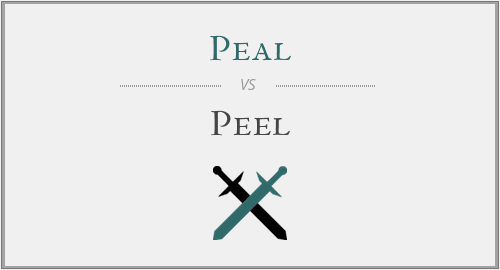"Peal" and "peel" may sound almost the same. This, for a non-native English user, might be confusing. If you find yourself wondering which spelling is correct for your context, or aim to understand what each word means and how it is correctly used, you couldn't have come to a better place to learn. Grammar.com will provide you every explanation you need to clear away your doubts.
Peal vs. Peel
Not only phonetically "peal" and "peel" are almost identical due to their similar spelling; but also syntactically. Both "peal" and "peel" can be used as verbs and nouns as well. So this is not the answer to distinguish them correctly. But vocabulary. "Peal" and "peel" carry completely different meanings, and understanding their definitions is the key towards using them correctly in the future.
When do we use "peal"?
As noun, "peal" defines the loud ringing of a bell; but it can also refer to the loud reverberating or repeated sound of laughter or thunder. At the same time, "peal" can also be used as a verb, meaning ringing loudly.
Example 1: The long and loud peal of the bell started to become annoying. - "peal" used as a noun defines the loud ringing of a bell.
Example 2: The witch suddenly burst into peals of laughter. - as noun, "peal" also has the secondary meaning of reverberating or repeated loud sounds of laughter.
Example 3: - All the bells held by the children started to peal simultaneously. - "peal" can also be used, sometimes, as a verb, referring to the action of loudly ringing.
When do we use "peel"?

Just like "peal", "peel" is also used both as noun and as verb. And the meanings of both its syntactical functions are also strongly related. "Peel", as a noun, is defined as the skin of a fruit or vegetable, especially after it has been removed. Used as a verb, "peel" refers to the action of removing the skin of a fruit or vegetable. As a secondary meaning, it can also refer to the action of removing something from a surface, or the action of something that falls off from a surface.
Example 1: Add lemon peel to give the composition a sour & bitter flavor. - used as noun, "peel" refers to the skin of a fruit after it's been removed.
Example 2: You should peel the orange before you eat it. - as verb, "peel" usually means removing the skin of a fruit.
Example 3: The painting started to peel off in those places where the wall was damp. - "peel" can also refer to something falling off from a surface.
Conclusion
"Peal" and "peel" might have similar spellings, but this doesn't bring any similarity between their meanings. Make sure you correctly distinguish and use them in your own sentences in order to avoid confusing your audience!




Have a discussion about this article with the community:
Report Comment
We're doing our best to make sure our content is useful, accurate and safe.
If by any chance you spot an inappropriate comment while navigating through our website please use this form to let us know, and we'll take care of it shortly.
Attachment
You need to be logged in to favorite.
Log In